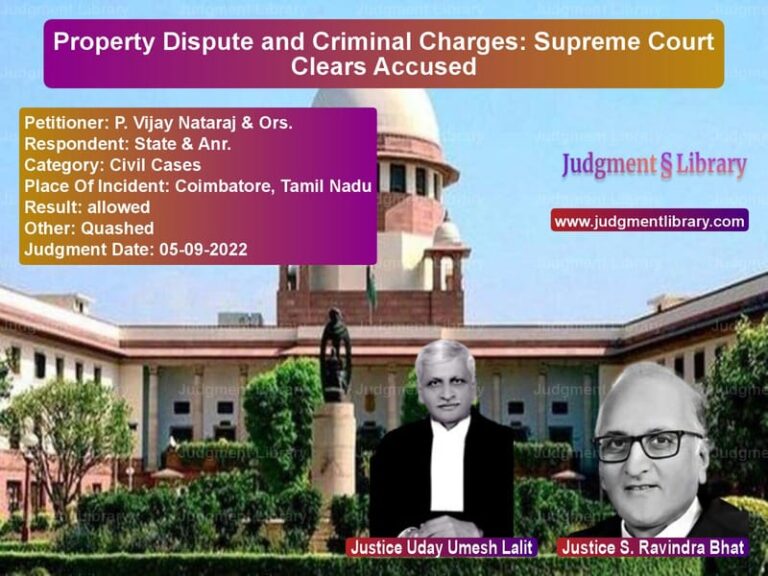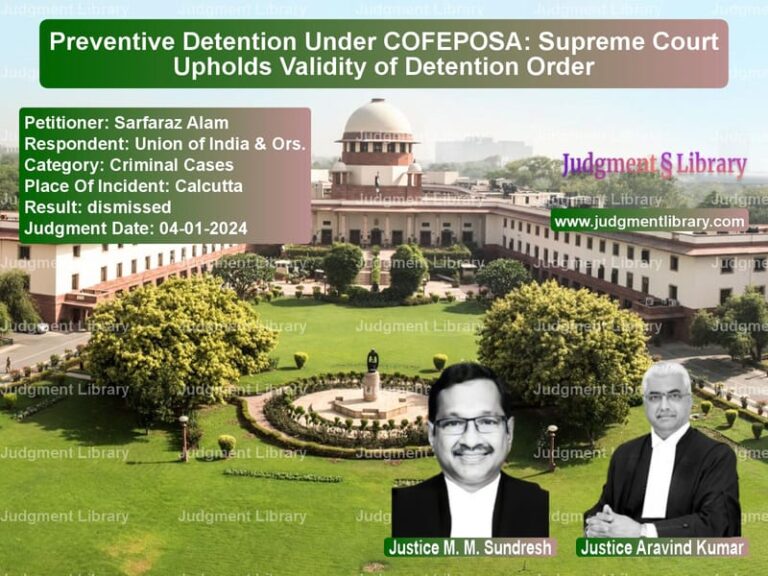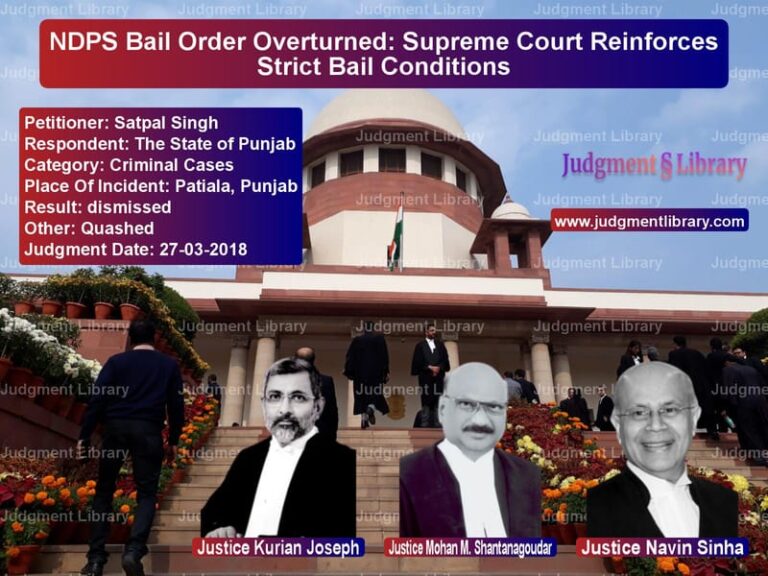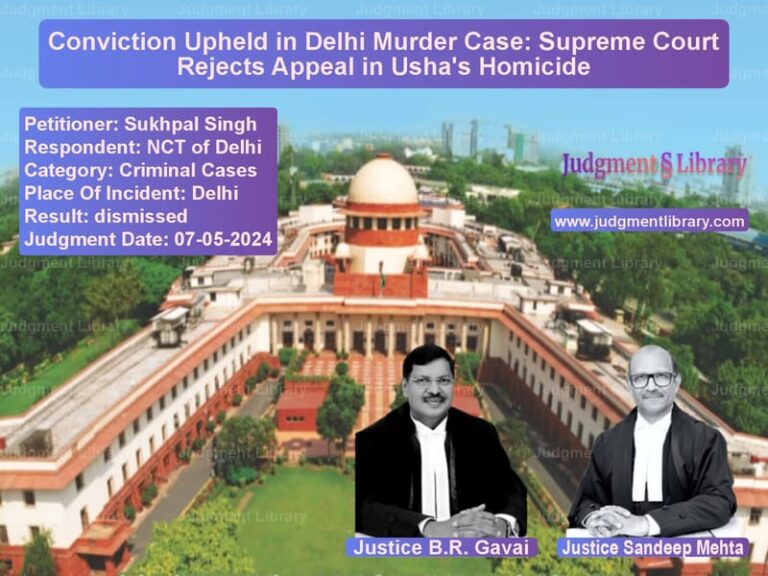Supreme Court Acquits Accused in 1999 Haryana Murder Case Due to Lack of Evidence
The Supreme Court of India, in its judgment dated January 12, 2024, acquitted Mohd. Jamil of murder charges under Section 302 IPC, ruling that the prosecution failed to provide sufficient evidence to establish his guilt beyond reasonable doubt. The Court upheld his conviction under Section 323 IPC but set aside his conviction for murder.
Background of the Case
The case originated from an incident that occurred on January 9, 1999, in Nuh, Haryana, where a violent altercation led to the death of Akbar and injuries to Deenu (PW-1), Ahmad (PW-2), and Harun. The accused—Mohd. Yunus (A1), Mohd. Jamil (A2), Ghasita (A3), and Akhtar Hussain (A4)—were charged under Sections 302 and 323 read with Section 34 IPC.
The Sessions Court convicted Yunus, Jamil, and Ghasita for murder while acquitting Akhtar Hussain. The High Court upheld the convictions of Jamil and Ghasita but acquitted Yunus of murder charges. The State of Haryana challenged Yunus’s acquittal, and Jamil appealed against his conviction before the Supreme Court.
Key Legal Issues
- Whether the prosecution proved the murder charge under Section 302 IPC against Jamil beyond reasonable doubt.
- Whether the High Court erred in acquitting Yunus while convicting Jamil for murder.
- Whether the testimonies of the eyewitnesses were reliable and credible.
Petitioner’s Arguments (State of Haryana)
The State of Haryana contended that:
- The same set of evidence used to convict Jamil should have been applied to Yunus.
- The High Court erred in acquitting Yunus while convicting Jamil for the same offense.
- Jamil actively participated in the crime, and his conviction under Section 302 IPC was justified.
Respondent’s Arguments (Mohd. Jamil)
Jamil’s counsel argued that:
- The FIR was delayed and possibly manipulated to frame him.
- The eyewitnesses were related to the deceased and had contradictions in their statements.
- The medical evidence did not conclusively establish that Jamil caused the fatal injuries.
Supreme Court’s Observations
The Supreme Court scrutinized the evidence, including medical reports and witness statements, before delivering its verdict.
1. Contradictions in Eyewitness Statements
“The credibility of key prosecution witnesses is under serious doubt due to contradictions, improvements in statements, and previous enmity with the accused.”
The Court noted that the statements of Deenu (PW-1) and Ahmad (PW-2) contained inconsistencies, making their testimonies unreliable.
2. Lack of Corroborative Evidence
“The recovery of weapons from Jamil and Yunus was not proved beyond doubt. The evidence linking the accused to the crime is weak.”
The Court found that the prosecution failed to establish Jamil’s role in the murder through forensic or material evidence.
3. No Direct Causation of Death
“The post-mortem report does not conclusively attribute the fatal injuries to Jamil. The prosecution must establish beyond reasonable doubt that the accused’s act directly caused the death.”
The Court observed that multiple accused were alleged to have attacked the deceased, but the exact role of each accused in causing the fatal injuries was unclear.
Final Judgment
The Supreme Court acquitted Jamil of the murder charge but upheld his conviction under Section 323 IPC. The Court ruled:
“The conviction of appellant Mohd. Jamil under Section 302 read with Section 34 IPC is set aside. However, his conviction under Section 323 IPC is maintained.”
As Jamil had already served six months for the lesser charge, the Court discharged his bail bonds.
Key Takeaways from the Judgment
- Eyewitness testimony must be consistent and free from contradictions to sustain a conviction.
- Medical and forensic evidence is crucial in establishing causation in homicide cases.
- Acquittal of one accused on similar evidence raises doubts about the conviction of others.
- The benefit of the doubt should be given when evidence is weak or inconclusive.
This judgment reinforces the importance of fair trials and the necessity of strong, corroborated evidence in criminal convictions.
Petitioner Name: State of Haryana.Respondent Name: Mohd. Yunus & Ors..Judgment By: Justice M.M. Sundresh, Justice Prashant Kumar Mishra.Place Of Incident: Nuh, Haryana.Judgment Date: 12-01-2024.
Don’t miss out on the full details! Download the complete judgment in PDF format below and gain valuable insights instantly!
Download Judgment: state-of-haryana-vs-mohd.-yunus-&-ors.-supreme-court-of-india-judgment-dated-12-01-2024.pdf
Directly Download Judgment: Directly download this Judgment
See all petitions in Murder Cases
See all petitions in Bail and Anticipatory Bail
See all petitions in Judgment by M.M. Sundresh
See all petitions in Judgment by Prashant Kumar Mishra
See all petitions in partially allowed
See all petitions in Modified
See all petitions in supreme court of India judgments January 2024
See all petitions in 2024 judgments
See all posts in Criminal Cases Category
See all allowed petitions in Criminal Cases Category
See all Dismissed petitions in Criminal Cases Category
See all partially allowed petitions in Criminal Cases Category







